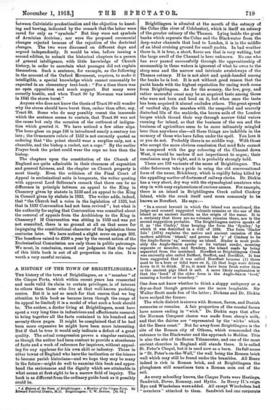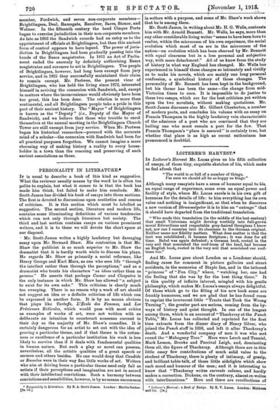A HISTORY OF THE TOWN OF BRIGRTIANGSEA.*
THE history of the town of Brightlingsea, as a " member " of the Cinque Ports, Which within recent years has reasserted and made Valid its claim to certain privileges, is of interest to Others than those who live at that well-known yachting centre. But it is not so much for that reason that we beg attention to this book as because (even though the range of its apteal be limited) it is a model of what such a book should be. The author, a doctor living at Brightlingsea, must have spent a very long time in industrious and affectionate research to bring together an the facts contained in his hundred and seventy-three pages. It might be complained that if he had been inore expansive he might have been more interesting. But if that be true it would only indicate a defect of a great quality. The actual compression proves a singular restraint, as though the author had been content to provide a storehouse of facts and a work of reference for inquirers, without appeal. ing for any applause for his own skill or industry. Those in other towns of England who have the inclination or the leisure to become parish historians—and we hope they may be many in the future—might do well to examine this book and appre- hend the seriousness and the dignity which are attainable in what seetna atAtilt sight to be a narrow field of inquiry. The book is as different from the ordinary guide-book as it possibly could be, • A kistory of the Town of Brightlinialea : a bleiaber of the Cinque Ports. By Edward Percival Dickin, M.D. Brightlingsea T. W. Barnes. [gs. ed.] Brightlingsei is situated at the Mouth of the estuary of the Caine (the river Of Colcheater), which is itself an estuary Of the greater estuary cif the Thames. tying ineide the great banks which separate the Collie and the BleckWater from the
deep-water channels that lead to London, it is in the middle of an ideal *raising ground for small yachts. In bad Weather there is, it is true, a short, fierce sea that is very vietting, but the large swell of the Channel is here Unknown. No one who has ever passed successfully through the apprenticeship of seamanship in these waters is ignorant of *hat he owes to the steep seas and the narrow and intricate svialichways of the Thames estuary. If he is not alert and quielt-handed among the banks be is lost. It is riot Without good reason that the
yacht hands With the highest reputation fOr raeing Work come from Brightlingsea. As for the scenery, the low, grey, and rather mournful coast may be ah acquired taste ariliing those who were not born and bred on it, but when once the taste
has been acquired it alniOst excludes others. The great spread of vaulted sky, the marshes With the unspoiled and scarcely disturbed life of the seabirds, the brown Emilie of the LOndori barges which thread their Way through narrow tidal waters running far inland, so that the bithinesi of the sea and the business of agriculture seem to be more intimately Mingled here than anywhere else—all these thinge are indelible in the Memory of those who have fallen Under the Spell. You love it Or you do not. Probably there is no middle way.. With those
who accept the more obvious COnclUeiori that mud flats cannot be compared with the gay colouring Of the Ohannel down Weat, it would be uselesS if not impertinent to argue their conclusion may be right, and it is probably strongly held.
There are 193 variants of the name of Brightlingsea. The older fishermen take a pride in using the old conversational form of the name, Bricklesey, which iS rapidly being killed by the appalling matter-of-factneSs of railway clerks. Dr. Dickin has a very short, dry *ay with the etymological amateurs who
step in with easy explanation's of curioudnathes. For example, there is an island in Brightlingeee Creek called Cindery Island, while the creek itaelf used more cOinmonly to be known as Borefleet. He says :— "In a recent lawsuit in which the island %me mentioned, the judge and counsel suggested volcanic reinains or the use of tha island as an ancient dustbin as the origin of the name. It is a certainty that there are no volcanic remains there, nor LS the second suggestion probable. The Brightlingsea native speaks of it as the Cindry,' thus keeping the forth the Syndry,' by which it was described in a will of 1629. The form Sinder Isle' (1674) explains the native and ancient omission of the modern addition • island,' and proves the 'y' of Cindery to be the Anglo-Saxon • ey,' meaning an island. Sinder is most prob- ably the Anglo-Saxon synder or it variant sunder, meaning separate or asunder, and Syndety, the island made by being separated from the mainland. Borefieet or Brightlingsea Creek was anciently also called Balfieet, Berfliet, and Bordfliet. It has been suggested that it was called Boreileet because (1) there used to be a bore or tidal wave on it, (2) that hogs were driven down to it to drink. If so, it roust have been fresh water then or the ancient pigs liked it salt. A more likely explanation is that the bord ' of the older form is the Anglo-Saxon bord: meaning a border or boundary."
One does not know 'whether to think a sloppy antiquary or . a dry-as-dust though genuine one the more laughable. Sir Walter Scott made fun of the latter; Dickens and Dr. Dickin have scalped the former.
The whole district is strewn with Roman, Saxon, and Daniell memories or remains. A fair proportion of the coastal farms have names ending in "wick." Dr. Dickin says that after the Norman Conquest cheese was made from sheep's milk, and that the dairies are "represented by the 'wicks • which dot the Essex coast." Not far away from Brightlingsea is the site of the Roman city of Otliona,, which commanded the entrance to the Blackwater and the approach to Maldon. This is also the site of the Saxon Ythancest,er, and one of the most ancient churches in England still stands there. It is called St. Peter's Chapel, but it is used now as a barn. Its full name
is " St..Peter's-on-the-Wall," the wall being the Roman brick wall which may still be found under the brambles. All Essex indeed is rich in Roman brick, and itt Brightlingsea the ploughmen still sometimes turn a Roman coin out of the soil.
As every schoolboy knows, the Cinque Ports were Hastings, Sandwich, Dover, Romney, and Hythe. In Henry H.'s reign Rye and Winohelsea were added, All except Winchelsea had
" members " attached to them. Sandwich bad one corborete
member, Fordwich, and seven .non-corporate members- Brightlingsea, Deal, Ramsgate, Reculver, Sarre, Stonor, and Walmer. In the fifteenth century the head Cinque Ports began to exercise jurisdiction in their non-corporate members. As late as 1803 the Sandwich records had an entry as to the appointment of officials at Brightlingsea, but then this ancient form of control appears to have lapsed. The power of juris- diction in Brightlingsea had been gradually passing into the hands of the Essex magistrates. In 1811 an Act of Parlia- ment ended the anomaly by definitely authorizing Essex magistrates and coroners to act in Brightlingsea. The people of Brightlingsea, however, had long been exempt from jury service, and in 1825 they successfully maintained their claim to remain exempt. Mr. Pertwee, the present vicar of Brightlingsea, who has held the living since 1872, interested himself in reviving the connexion with Sandwich, and, except in matters where the inconvenience would obviously have been too great, this has been done. The relation is more than sentimental, and all Brightlingsea people take a pride in this part of their ancient history. The " Mayor " of Brightlingsea is known as the " Deputy " (i.e., Deputy of the Mayor of Sandwich), and we believe that those who trouble to enrol themselves at the annual meeting in the Brightlingsea Church Tower are still exempt from jury service. When Mr. Pertwee began his historical researches—pursued with the accurate mind of a scholar—the connexion with Sandwich had been for all practical purposes forgotten. We cannot imagine a more charming way of making history a reality to every house- holder in a town than the rescuing and preserving of such ancient associations as these.































































 Previous page
Previous page